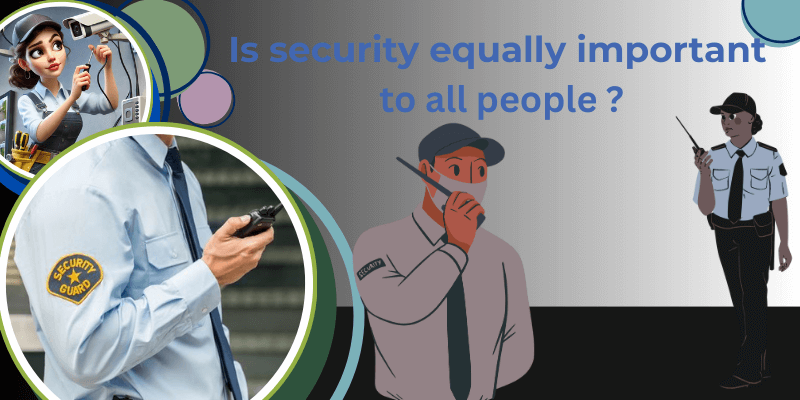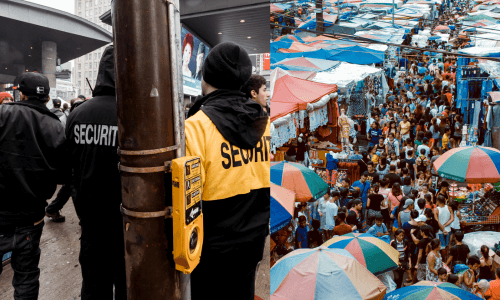Is security equally important to all people ?

The word “security” conjures up different images in our minds. For some, it’s a lock on the front door. For others, it’s a uniformed guard outside a building. Some might think of cybersecurity, CCTV cameras monitoring, protecting bank accounts and personal information from hackers. And many of us think of feeling safe in our surroundings, comfortable knowing that no harm is coming our way.
But here’s the big question: Is security equally important to all people?
At first glance, the obvious answer seems to be yes, of course—it’s important to everyone. After all, who doesn’t want to feel safe? But when you look deeper, the answer becomes even clearer. Security is important to all people, but the type, level, and urgency of security are not the same for everyone.
In this blog, we’ll explore what security means, how it manifests in different people’s lives, and whether it carries the same importance for everyone.
What do we really mean by “security”
Before we debate whether it is equally important for all people, let’s analyse what security means or is needed.
Physical security – protection from harm, property protection, violence, or theft.
Financial security – being able to pay bills, buy food, and save money without constant worry.
National security – protecting the country from external threats such as terrorism or war.
Social security – having systems in place to take care of people in the long term, such as healthcare or social benefits.
Digital security – keeping personal information safe online, keeping passwords secure, and avoiding fraud.
So, when we talk about “security,” we’re not just talking about alarms and CCTV cameras. We’re talking about a broader human need – the instinct to be safe and survive.
Why Security Isn’t “Equally” Important in Practice

Let’s be honest—while everyone may need security, not everyone has the same opportunities. Some enjoy a level of security in their lives, while others live in constant vulnerability.
Economic background makes a big difference
A wealthy family might live in a gated community, hire security guards, and pay for insurance against burglary.
A poor family living in a crime-prone neighbourhood might not even have the option of installing a basic door lock or security system.
Yes, both families value security—but one relies on it as a convenience, the other sees it as an absolute necessity.
Geography and location priorities
A person living in a peaceful city might be more concerned about online scams.
Someone living in a conflict zone might be simply concerned about survival today.
The “definition” of what kind of security is most important depends a lot on where they are and what the situation is like there.
Social identity plays a role
Women may prioritize personal safety when walking home at night and feel safe and secure.
Generational differences
Older people may worry about pensions, stable healthcare, and physical security.
Younger generations often focus on cybersecurity and privacy.
Security means different things at different stages of life, even within the same family.
Do all people experience security in the same way?
This is where things get complicated. While security is important to everyone, not everyone experiences it in the same way.
A wealthy person in a gated community may be more concerned about cybercrime than physical theft.
A factory worker may be more concerned about job security and workplace safety than online privacy.
A refugee may think of security in terms of finding food, shelter, and protection from violence.
A teenager may think of security as having private messages that parents or strangers cannot access.
So while the importance of security is shared, the type of security people value most often depends on their situation.
Can security ever be equal?

So, back to the original question: is security equally important to all people?
In one sense, yes: it is a basic human need. No matter who you are, you want to feel safe and secure.
But in another sense, no: different people place different values on different types of security, depending on their circumstances, culture, and personality.
In fact, it might be better to say: security is universally necessary, but not universally prioritized. The point is that people think about security as their own needs and find security according to their own needs.
Conclusion
So, is security equally important to all people?
The short answer: Security is important to everyone, but not in the same way, and not always to the same extent.
Yes, in a fundamental sense: everyone needs some form of security to live a peaceful life. Without it, human progress stagnates. It’s like oxygen – no one really says, “I don’t need security.”
No, in a practical sense: security has different forms and meanings. A soldier, a farmer, a student, and a retiree will not define “feeling safe” in the same way.
So instead of asking whether security is equally important to everyone, perhaps we should ask: How can we ensure that everyone has the security they need to live a dignified, fulfilling life?
